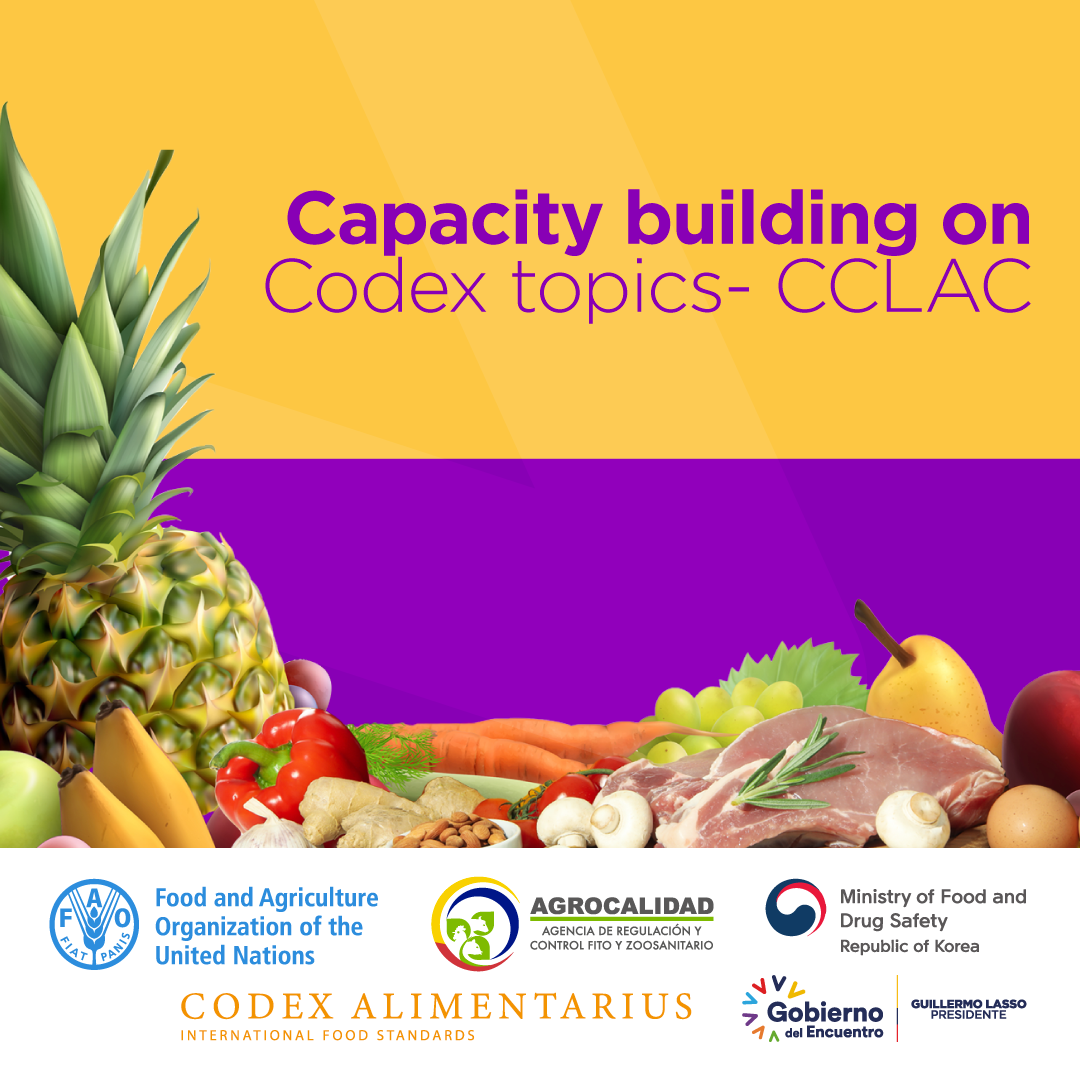Webinar series on Codex standards for the Latin American and the Caribbean region
Would you like to know more about how to strengthen the food safety system in your country?
The growing population worldwide, the increase in food demand, the consequent growth of the food industry, added to global health risks, demonstrate the importance of incorporating food safety into national policies and strengthening the food safety systems. Foodborne diseases generate great impacts on the health of the population.

The Phyto and Zoosanitary Regulation and Control Agency of Ecuador (AGROCALIDAD), as the base of the FAO/WHO Coordinating Committee for Latin America and the Caribbean (CCLAC), and the FAO Regional Office for Latin America and the Caribbean (FAO RLC), invites to the series of webinars on Codex standards.
- Module 1: Guide and orientation for new Codex Alimentarius participants
14- 15 September 2022, 10:00 - 12:00 GMT-5 - Module 2: Basic Codex texts
7 December 2022, 10:00 - 12:00 GMT-5
The webinars will be held in Spanish and English, recordings will be also available on the event website.
As part of the AMR Codex Texts (ACT) project “Implementation of Codex standards to support containment and reduction of foodborne antimicrobial resistance”, the series of virtual seminars will be held for the entire Latin American and Caribbean region in 2022-2025. The aim is to promote the application of Codex standards to strengthen the national food safety systems.
For more information, please visit here (English) and here (Spanish).
Registration for module 1: Meeting Registration - Zoom
At the heart of the Codex mandate are the core values of collaboration, inclusiveness, consensus building and transparency. Governmental and non-governmental, public and private organizations alike play a vital role in ensuring Codex texts are of the highest quality and based on sound science.
Codex would have little authority in the field of international standard setting if it did not welcome and acknowledge the valuable contributions made by observers. Expert technical bodies, industry and consumer associations
contribute to the standard-setting process in a spirit of openness, collaboration and transparency.
Intergovernmental organizations (IGOs) and international non-governmental organizations (NGOs) can apply for observer status in Codex in order to attend and put forward their views at every stage of the standard-setting process.
 Current Codex Alimentarius Commission
Current Codex Alimentarius Commission
Webinar series on Codex standards for the Latin American and the Caribbean region
Would you like to know more about how to strengthen the food safety system in your country?
The growing population worldwide, the increase in food demand, the consequent growth of the food industry, added to global health risks, demonstrate the importance of incorporating food safety into national policies and strengthening the food safety systems. Foodborne diseases generate great impacts on the health of the population.

The Phyto and Zoosanitary Regulation and Control Agency of Ecuador (AGROCALIDAD), as the base of the FAO/WHO Coordinating Committee for Latin America and the Caribbean (CCLAC), and the FAO Regional Office for Latin America and the Caribbean (FAO RLC), invites to the series of webinars on Codex standards.
- Module 1: Guide and orientation for new Codex Alimentarius participants
14- 15 September 2022, 10:00 - 12:00 GMT-5 - Module 2: Basic Codex texts
7 December 2022, 10:00 - 12:00 GMT-5
The webinars will be held in Spanish and English, recordings will be also available on the event website.
As part of the AMR Codex Texts (ACT) project “Implementation of Codex standards to support containment and reduction of foodborne antimicrobial resistance”, the series of virtual seminars will be held for the entire Latin American and Caribbean region in 2022-2025. The aim is to promote the application of Codex standards to strengthen the national food safety systems.
For more information, please visit here (English) and here (Spanish).
Registration for module 1: Meeting Registration - Zoom
 Codex and Observer
Codex and Observer
around the world since ancient times.
We might not always know where it comes from,
but we expect it to be available, safe and of good quality.









Leave a comment